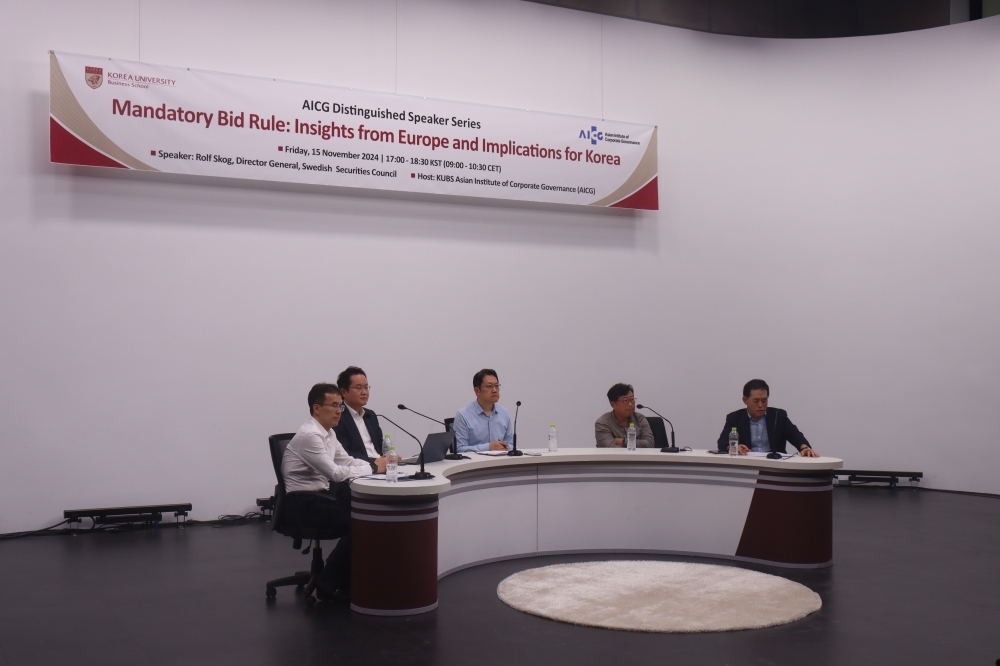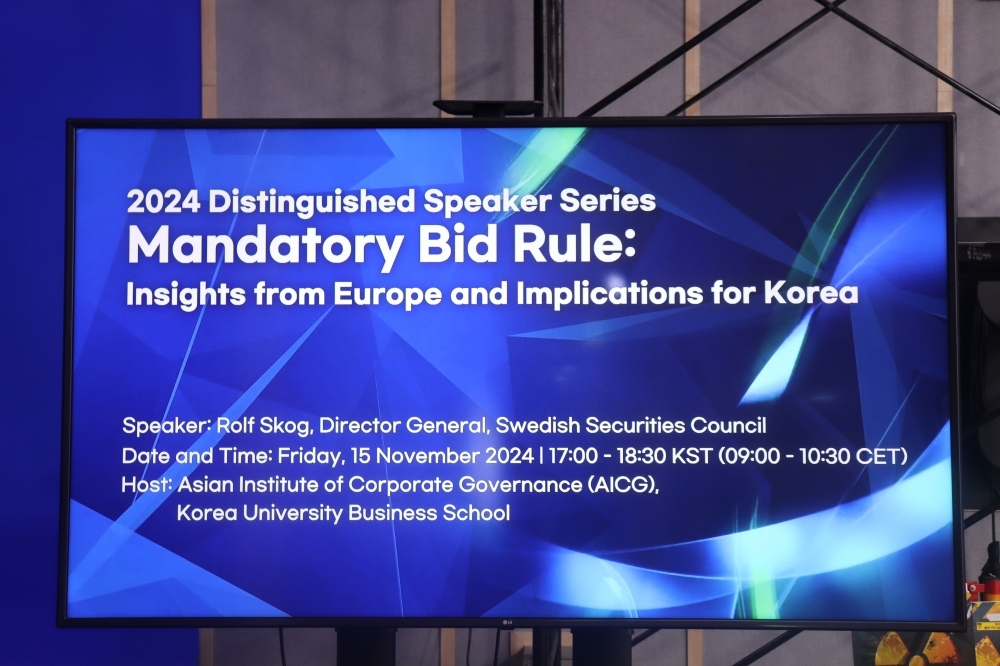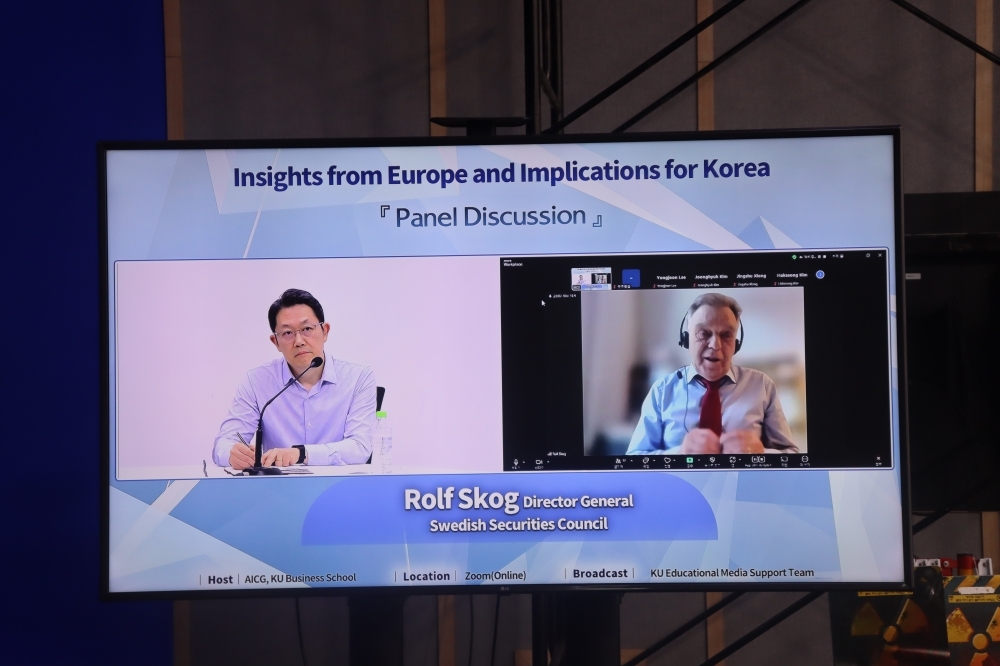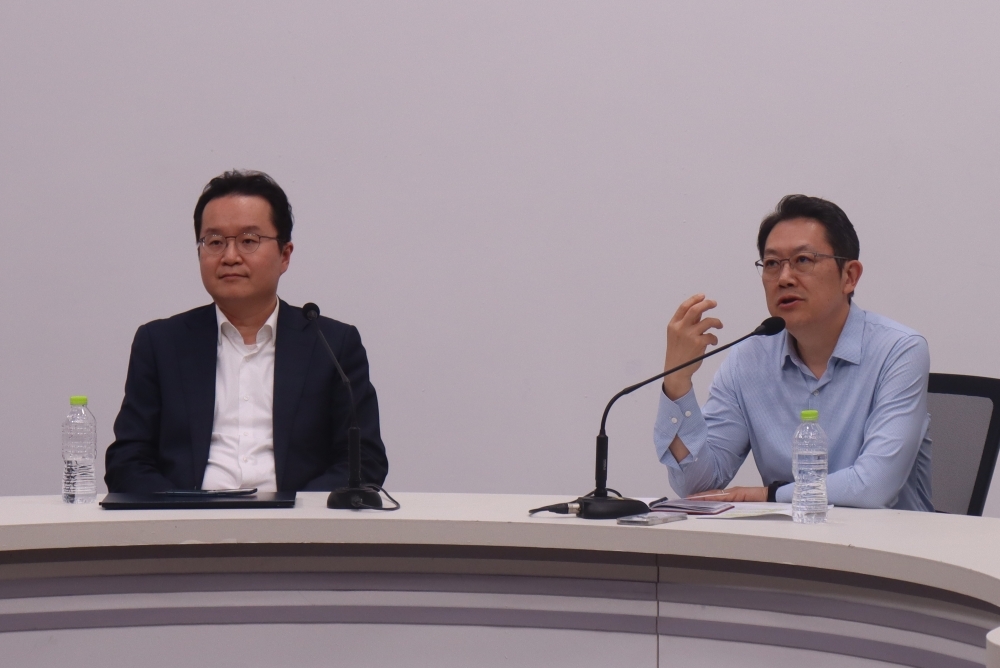News
KUBS News
Korea University Asian Institute of Corporate Governance Hosts Seminar on European Mandatory Tender
2024.11.29 Views 2200 국제실
Korea University Asian Institute of Corporate Governance Hosts Seminar on European Mandatory Tender Offer Practices with a Swedish Expert
On November 15, Korea University Business School Asian Institute of Corporate Governance hosted an online seminar featuring Rolf Skog, the Secretary-General of the Swedish Securities Council. The seminar, titled “Experiences of Operating the European Mandatory Tender Offer System and Its Implications for Korea,” aimed to explore strategies for implementing a suitable mandatory tender offer system in Korea by examining Sweden’s case studies. The seminar was moderated by Professor Joon Ho Hwang, with panelists including Professor Woojin Kim from Seoul National University Business School, Professor Woochan Kim, H&Q Korea Co-CEO Yuchul Rhim, and Professor Joon Hyug Chung from Seoul National University School of Law.

The seminar began with a keynote presentation by Secretary-General Rolf Skog on the topic of “The Mandatory Tender Offer System: Sweden’s Experience.” Secretary-General Skog highlighted that corporate acquisitions in Sweden have become more active since the introduction of the mandatory tender offer system. He noted, “While there were initial concerns about a potential chilling effect, these concerns have since dissipated, and there have been no demands for system revisions.” He shared this as a case of successful system implementation.
Secretary-General Skog provided a detailed explanation of the Swedish Securities Council's practices. The Swedish Securities Council is a self-regulatory body responsible for interpreting laws related to corporate acquisitions and granting special exemptions from the mandatory tender offer system. The Council handles approximately 60 to 70 cases annually, focusing on maintaining transparency and fairness in its operations.

The mandatory tender offer system is triggered when an acquirer, together with related parties, obtains 30% or more of a company’s shares. Related parties include spouses, minor children, affiliated companies, and parties acting in concert regarding voting rights. The methods of share acquisition can vary, including purchase, inheritance, or the exercise of conversion rights. However, instruments such as preemptive rights or convertible bonds are included only once they are converted into shares.
Upon triggering the mandatory tender offer, the acquirer must disclose their shareholding immediately and propose a tender offer for all remaining shares within four weeks. If the tender offer is not made, the acquirer is required to reduce their shareholding to below 30%. The tender offer price is determined based on the higher of the two: the highest purchase price paid during the six months preceding the trigger or the volume-weighted average price over the most recent 20 trading days.
Special exemptions are granted in cases where an individual’s shareholding exceeds 30% as a result of participating in a rights offering or where the individual holds more than 30% but is not the largest shareholder. However, further shareholding increases are not permitted under these exemptions. The mandatory tender offer system does not apply if an acquirer obtains over 30% of shares through a public tender offer made to all shareholders. While such legal exceptions could potentially allow for low-priced tender offers that lower subscription rates, such cases are rare in Sweden.
In the event of non-compliance, restrictions are imposed on voting rights for shares exceeding the 30% threshold, and corrective orders are issued. These measures reflect the system’s intent to enhance fairness and accountability in corporate acquisitions.

The panel discussion that followed focused on “Experiences in Operating the European Mandatory Tender Offer System and Its Implications for Korea.” The discussion began with an analysis of Sweden’s experience, where initial concerns about a potential chilling effect at the time of the system’s introduction proved unfounded. In fact, the market for acquisitions became more active, and no demands for revisions to the system were raised. Meanwhile, the strategy of proposing low tender offer prices, known as “lowballing,” has been rare in Sweden but has emerged as an issue in other EU countries, suggesting the potential for increased regulatory discussions in the future.
Since the system’s adoption, companies have often preferred methods that avoid triggering mandatory tender offer obligations. In cases where the acquisition of controlling shareholders’ stakes is expected to push ownership beyond the 30% threshold, companies have frequently opted for tender offers targeting all shareholders, including controlling shareholders, at a single price agreed upon in advance with the controlling shareholder.
Regarding Korea’s proposed “50%+1 share” approach to the mandatory tender offer system, panelists highlighted that it may fail to sufficiently protect minority shareholders by limiting their opportunity to sell their shares during changes in control. This approach is not adopted in major European countries for this reason.
The panel also noted that differential pricing in tender offers would be challenging to implement. In Sweden, there is a strong belief that control premiums should be distributed equitably among both minority and controlling shareholders. This principle, driven by institutional investors, supports the requirement that all shares in a tender offer must be purchased at the same price.
The Swedish Securities Council was praised for its strengths, including efficient processing and an expert-driven membership. While decisions that might take months for the Financial Supervisory Authority are resolved in just days by the Council, the Council also enjoys greater trust due to its expertise. Although appeals of Council decisions are allowed, they are exceedingly rare.
Finally, for financially distressed companies, decisions on whether to grant special exemptions for shareholdings exceeding 30% are made based on what serves the best interests of the shareholders. However, such cases represent a small proportion of the total number of exemptions granted.

Meanwhile, Korea University Business School Asian Institute of Corporate Governance organized this seminar as a platform to explore strategies for introducing a mandatory tender offer system tailored to Korea’s capital market and corporate environment, drawing on European case studies. The institute plans to continue conducting related research and hosting seminars in the future.


